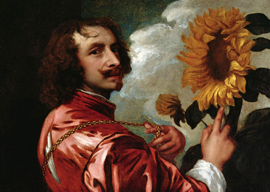
May 06, 2017

Self-portrait with a sunflower, Anthony van Dyck
Source: Wikimedia Commons
Like most governments these days, the Irish government is a patron of the arts. The problem is that most governments know as much about the arts as I know about how to select camels for a camel race.
Naturally, therefore, governments rely on advisers to advise them on artistic matters, in effect delegating to them the disbursement of funds. Here the problem is that the art world is now so corrupt morally, intellectually, and aesthetically that the advice it gives is more likely to resemble Mr. Madoff’s advice to investors than Lord Duveen’s to Henry Clay Frick. There has always been bad art, of course, but rarely has it been so heavily subsidized; and when we see work of which we are inclined to ask, “But is it art?” we should perhaps be asking instead, “Is it government-funded?”
The Irish Arts Council, however, recently came up with a novel, even transgressive idea (“transgressive” is the highest term of praise in current art criticism, incidentally), namely that the artists they subsidize should show some sign of artistic endeavor. It is true that the council’s choice of word, audit, was an unfortunate one, as if artists were accountants having their accuracy checked; and the eminent Irish writer Colm Toibin said that the council’s terminology”for example, “working artists engaged in productive practice””had a North Korean ring about it; an exaggeration, no doubt, given that the North Korean regime subjects its artists to something more severe than mere audit, but one knows what he means. These days it is increasingly difficult to distinguish, stylistically, between an official circular and a page from The Selected Works of Kim Il-sung. (The only one of those communist leaders worth reading, by the way, is Enver Hoxha, who had a wonderful natural gift for poisonous invective and insult. As by the end of his life he had fallen out with everyone, he also had a lot of practice at it; his principle was never to speak well of the dead, especially if he had killed them himself.)
But Mr. Toibin was exercised about the very idea of demanding of artists that they actually produce something in return for the money they receive. After all, many a great artist in the past has had a fallow patch in his life, sometimes lasting decades; you can”t just go to an artist and insist that he be inspired, any more than a photographer can insist that his subjects be natural in front of the lens. His logic appears to be:
Great artists a and b had fallow patches
Artist c is having a shallow patch
Therefore artist c is great and indefinitely worth subsidy
Now, I”m not against patronage as such; sometimes I even wish I had had a patron who had relieved me of the necessity to earn my daily bread (and jam). Then, surely, I would have written an imperishable masterpiece; I would have had time for le mot juste instead of having to make do with the le mot approximatif that mere journalism, as against literature, requires. But the government doesn”t have the taste or discrimination to act as patron. It can”t even choose its advisers well.
It does not follow from this that every private patron is a paragon of either good taste or discernment. But at least he wastes his own money rather than that of the entire population. Moreover, there is a better chance that a private patron will either have good taste or choose an adviser who does. An individual is more likely to choose well than a committee. The best patrons, of course, from the point of view of taste if not of morals, have been kings, not the pretend-king type such as an English king (Montesquieu understood that England was a republic with only a thin veneer of monarchy), but a proper, off-with-his-head-type monarchy, preferably with a dependent and parasitic aristocracy as well. Charles I collected Rubens and Van Dyck; George V collected stamps.
While I am at it, let me here mention that censorship is a precondition of the greatest art, at least if history is anything to go by. I mean a negative censorship, in which there are things that you can”t say, rather than a positive censorship, in which there are things that you must say: The latter is deadly. Preferably also the censorship should be light-handed, capricious, and unpredictable: The perfect recipe for the production of art (though, as every cook knows, some recipes go wrong even when you stick to them) is absolute monarchy with incompetent censorship and religious belief.